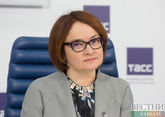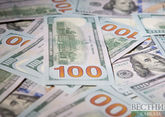Russian companies increased their foreign exchange reserves in cash, Russia's Central Bank said.
As of July 1, 2017, the total amount of foreign exchange reserves in cash in Russian banks and other sectors amounted to $59.8 billion, while "other sectors" account for $54.5 billion. This is a record for the entire history of observations.
The Bank of Russia specified that 'other sectors' includes both companies and the purchase of currency by citizens.
Advisor on macroeconomics to the CEO of the 'Opening-Broker' brokerage house, economist Sergey Hestanov, speaking to Vestnik Kavkaza, noted that Russian companies and citizens buy dollars, while they are relatively cheap. "There have been a quite strong strengthening of the ruble against foreign currency. While both citizens and business expect that the ruble exchange rate will decrease in the foreseeable future. And it happened synchronously, which caused such record indicators," the expert explained.
Sergey Hestanov rejected the possibility of limiting dollar's circulation in the country. "These are nothing more than rumors, at least in the near future," the economist stressed, adding that a long-term trend towards the accumulation of foreign currency will lead to an increase in the outflow of capital from Russia.
However, there is no possibility to predict the depreciation of the ruble. "In modern economic science there is no single theory of the formation of the exchange rate, which means it is impossible to calculate the exchange rate reliably," he said.
"The current strong ruble has caused considerable damage to the exporters' business. It harms all enterprises that are engaged in real import substitution, that is, those directly competing with the imported goods. But, as a rule, such state of affairs does not last long. Therefore, in some foreseeable future, the ruble is likely to weaken against the dollar.. Unfortunately, it will be difficult to predict when it may happen, may be closer to the New Year, ot maybe only after the presidential elections in the spring," Sergey Hestanov concluded.










